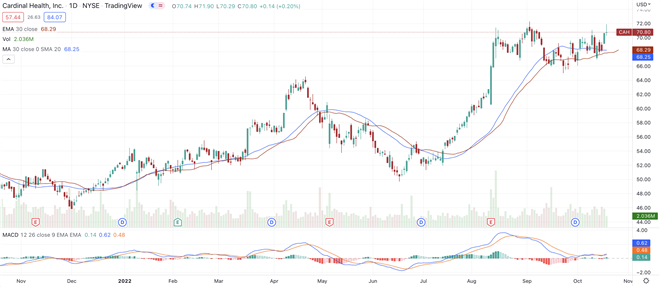

Cardinal Health (NYSE: CAH), which distributes branded and generic pharmaceutical products, and also manufactures, sources, and distributes products for medical, surgical, and laboratory uses, cleared a cup-with-handle buy point Wednesday.
That’s a pretty impressive feat, considering the stock posted gains even as the broader market declined.
Does that mean it’s time to buy?
The current base builds upon two earlier consolidations that began in April 2021. The stock broke out of the first consolidation a full year later, as the stock missed out on the 2021 broad market rally altogether.
Cardinal cleared its second consolidation in mid-August, but within a few weeks was correcting again as the broader market struggled.
The stock bounced decisively off its 10-day moving average Tuesday, and added to those gains in Wednesday’s session, closing at $70.80, up $0.14, or 0.20%. That was 2.4% above its 10-day line.
Cardinal is one of those relatively known S&P 500 components, checking in at No. 316, with a market capitalization of $18.55 billion.
Earnings and revenue data compiled by MarketBeat show that Cardinal beat top-line views in the past five quarters. It’s missed earnings views in four of the past five. The company has a long history of profitability, albeit growing at relatively low rates, and even declining at times.
The company’s reporting cycle is currently in fiscal 2023; in fiscal 2022, earnings declined 9%, to $5.06 per share.
Cardinal reports its fiscal first quarter on November 4, before the opening bell. Wall Street expects the company to earn $0.97 per share on revenue of $48.53 billion. That would be a decrease on the bottom line but an increase on the top line.
Cardinal’s three-year earnings growth rate is -3%, and its three-year revenue growth rate is just 7%.
Analysts expect that trend to reverse, with profit growing 3% to $5.23 per share in fiscal 2023, with another 18% growth the following year.
Data on institutional investors compiled by MarketBeat reveal more institutional buying than selling over the past 12 months. The largest institutional holders are asset management giants State Street and T. Rowe Price.
Despite a chart that shows a series of consolidations, Cardinal has posted a strong series of gains over the following rolling time frames:
- 1 month: +6.42%
- 3 months: +29.99%
- Year-to-date: +40.11%
- 1 Year: +52.49%
One thing that Cardinal has going for it: It’s part of an industry that tilts toward being defensive, as pharmaceuticals and medical supplies are always necessary. 
For the same reason, two of its peers in the medical wholesale sub-industry are also showing good price strength, relative to the wider market.
McKesson (NYSE: MCK) and AmerisourceBergen (NYSE: ABC) are outperforming the vast majority of other U.S.-listed stocks. Both companies boast continued sales and earnings growth in recent quarters.
McKesson’s three-year earnings growth rate is a solid 23%, while its sales growth rate during that time is 7%.
The company, which distributes specialty healthcare products and medical supplies to pharmacies and hospitals, reports its second quarter on November 1. Analysts expect it to earn $6.13 per share on revenue of $69.13 billion. That would be a decrease of $0.02 per share on the bottom line but an increase on the top line.
AmerisourceBergen has also shown steady sales and earnings increases. It’s grown earnings by 16% in the past three years, and revenue by 10%.
The Pennsylvania-based company distributes generic drugs, over-the-counter healthcare products, and home healthcare supplies. It reports its fiscal fourth quarter on November 3, with Wall Street eyeing net income of $2.58 a share on revenue of $60.80 billion.
MarketBeat earnings data for AmerisourceBergen show that the company topped sales and earnings expectations in the past two quarters.
With all these companies reporting earnings in the next few weeks, it may be wise to avoid buying until results are delivered. Even if a company tops views, something in the forecast could scare investors, even temporarily, and send the stock lower. These days, with fears about inflation and a recession, there’s plenty of reason to be cautious. If a stock rockets higher after earnings, you’ll have plenty of time to jump in.